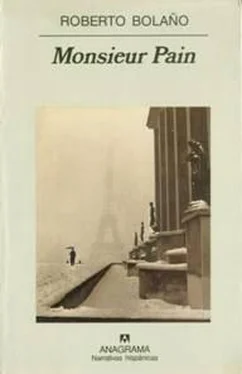Roberto Bolaño - Monsieur Pain
Здесь есть возможность читать онлайн «Roberto Bolaño - Monsieur Pain» весь текст электронной книги совершенно бесплатно (целиком полную версию без сокращений). В некоторых случаях можно слушать аудио, скачать через торрент в формате fb2 и присутствует краткое содержание. Жанр: Триллер, на испанском языке. Описание произведения, (предисловие) а так же отзывы посетителей доступны на портале библиотеки ЛибКат.
- Название:Monsieur Pain
- Автор:
- Жанр:
- Год:неизвестен
- ISBN:нет данных
- Рейтинг книги:3 / 5. Голосов: 1
-
Избранное:Добавить в избранное
- Отзывы:
-
Ваша оценка:
Monsieur Pain: краткое содержание, описание и аннотация
Предлагаем к чтению аннотацию, описание, краткое содержание или предисловие (зависит от того, что написал сам автор книги «Monsieur Pain»). Если вы не нашли необходимую информацию о книге — напишите в комментариях, мы постараемся отыскать её.
En una conversación de bar parisino, monsiuer Pain discute sobre mesmerismo con otro paciente -quizá un farsante-, que le recuerda que uno de los practicantes de esta teoría (que pretendía curar mediante el uso del magnetismo) fue el médico inglés Hell, apellido que, discurren los dos, significa infierno. Curiosamente no llevan la analogía más allá, pero quizá en esta charla se encuentra una de las claves de la sorprendente novela del narrador chileno, avecindado en España, Roberto Bolaño, Monsieur Pain, que la editorial Anagrama reeditó recientemente. A lo largo de toda la historia, los nombres de los protagonistas son parte fundamental del misterio y llevan a este seguidor de las enseñanzas de Mesmer a un insólito viaje por el París de la primera posguerra, en donde convalece César Vallejo y aún resuenan los disparos de la guerra civil española.
La historia ocurre en 1938 e inicia cuando madame Reynaud, una viuda joven a la que Pierre Pain ama en silencio, le pide a éste -que asistió en la agonía a su esposo- que ausculte al poeta peruano, convaleciente en un hospital a causa de un ataque de hipo. Esta petición es el detonador de una aventura inquietante donde tienen cabida tanto los seguidores de Mesmer como ciertos conspiradores de origen español, e incluso las investigaciones metafísicas de Pierre Curie forman parte de la intriga.
La novela de Bolaño es un pastiche, un collage de situaciones que poco a poco sugieren una historia aún más oscura: la de una conspiración maligna no sólo contra el poeta que agoniza sino también contra ciertas teorías que, como el propio mesmerismo, rechazan la verdad científica oficial. Monsieur Pain será el encargado de descubrir los hilos de esta trampa, pero al realizar su investigación sólo encontrará lo que profetiza su apellido. Incapaz de enfrentar a los verdugos, el protagonista de la novela callará para siempre lo que descubrió o aquello que simplemente creyó intuir.
Bolaño, cuya novela Los detectives salvajes ha conocido un éxito inusitado, se muestra aquí como un narrador de buena mano: algunos protagonistas fueron personas reales y algunos de los hechos que ocurren en la novela -la muerte de Curie o la de Vallejo- sucedieron realmente, pero el autor ha mezclado de tal suerte las historias que el resultado es inquietante y, por momentos, perturbador.
Pain es la clave, lo que leemos es la historia de un momento de su vida y su fracaso tanto en el amor como en la resolución de un misterio que está más allá de sus propias fuerzas. Para hacer aún más profundo el enigma, al final de la obra el autor plantea la vida de sus protagonistas a través de diversas voces que prefiguran los testimonios acerca de sus `detectives``. Y de alguna manera el epílogo hace aún más inquietante el destino de Pain, las casualidades que lo llevaron a encontrarse, en una ciudad plagada de surrealistas, con dos fabricantes de cementerios marinos que desprecian a los seguidores de André Breton, así como con un mundo nocturno repulsivo y atrayente donde la única persona que parece comprenderlo es un portero argelino. Porque si bien monsieur Pain es incapaz de vestirse de héroe, el azar y sus leyes lo llevan por caminos jamás imaginados para concluir en el fracaso. Por eso su personalidad nos toca a todos. Pain representa al hombre que espera la derrota final, a quien no lo redime ni siquiera un último acto de rebeldía.
El protagonista de la novela de Bolaño vive una aventura que no esperaba pero también padece, como todo solitario, el terror a la oscuridad, la sospecha que anida en el corazón de los amantes desesperanzados y silenciosos. Y si parece que al final que no ocurre nada -o al menos eso podemos creer-, la verdad es que las peripecias del señor Pain son las que mantienen pendiente al lector hasta la última página. La novela en conjunto no es más que una gran trampa en la que caemos fácilmente. Pero de eso se trata precisamente: de seguir a Pierre Pain a lo largo de un periplo que lo llevará (y a nosotros con él) al desencanto.
Si bien Monsieur Pain no es la más lograda de las novelas de Roberto Bolaño, sí prefigura algunos de sus temas y ese estilo personal que ha convertido al escritor chileno en una de las más gratas revelaciones de la prosa latinoamericana de los últimos años.












